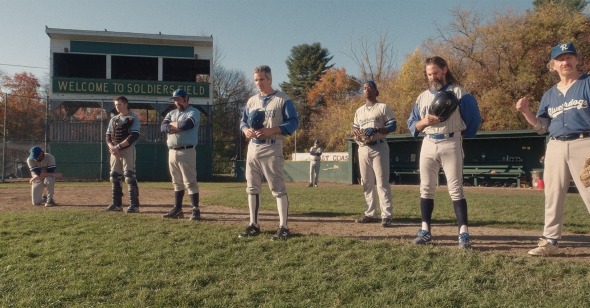Inside Baseball
By Caden Mark Gardner
Eephus
Dir. Carson Lund, U.S., Music Box
No other team sport can feel closer to endurance cinema than baseball. Prior to the recently implemented pitch clock in Major League Baseball, it was notoriously the only major sport not beholden to in-game time restrictions, as the comic George Carlin famously bemoaned. But those who love the sport, whether to play or to watch, find something experiential and immersive in succumbing to its many pleasures. Eephus, directed by Carson Lund, recaptures both the experience and ambiance in the passage of time on the basepaths and the dugout, as shared by like-minded individuals. It’s made with clear affection and a dry sense of humor towards ballplayers, in this case locals driven to finishing the last game to ever be played on their hometown baseball field. It is a work of Robert Coover–like fabulation and Beckettian existential absurdity that highlights baseball’s incongruities and contradictions. There has not been a fictional sports movie quite like Eephus, which deliberately unravels itself at the seams.
The title of the film references the eephus pitch—an off-speed breaking ball meant to disarm the batter with its severe, slow as molasses, arching trajectory—which is forever synonymous with Bill “Spaceman” Lee. Still pitching into his seventies in independent baseball leagues, Lee was very much the poster boy of the 1970s countercultural professional athlete. He appeared on the cover of High Times magazine as an outspoken marijuana user, and his left-leaning politics included everything from traveling to the Soviet Union as a baseball ambassador to running for office as a renegade third-party candidate. Lee’s life felt almost mythical, like George Plimpton’s 1985 Sports Illustrated article on New York Mets pitcher Sidd Finch and his 168 mph fastball. Plimpton’s famous April Fool’s Day piece was a dryly funny work of fiction, but Lee was real and sincere about all his outrageous proclamations and statements—being a lefty with an unusual yet effective specialist pitch was hardly the weirdest thing about him. Lee’s career stats were respectable if not particularly noteworthy, yet through his controversial force of personality he stood out, an indelible folk hero. Eephus is a love letter to both Lee (who appears in the film) and the game itself.
Eephus is set in a small 1990s New Hampshire suburb on baseball field grounds that will soon be demolished to build a school. The two recreational teams that intend to play the final game are filled with men of varied ages, backgrounds, and talents. The game nearly gets called off before it even begins, with the home plate umpire threatening a forfeit due to one of the teams missing a player. The player in question, who messed up the time of the game, arrives sprinting to the batter’s box—not even in full uniform—to avoid the embarrassing folly. Over the course of the game, tempers flare among both teams over in-game strategies and tactics. Only a handful of people are watching, most notably the official scorer Franny (Cliff Blake), an older gentleman with nothing better to do. When the umpires leave as day turns to evening, Franny gets elevated to home plate umpire and both teams attempt to run on an honor system. Just completing the nine innings becomes a Sisyphean task.
Time is foregrounded, with the film dropping interstitials between innings to mark the passing of the hours and underscore developments within the game, featuring famous quotes by Satchel Paige, Babe Ruth, and other legends. (My favorite is a Yogi Berra quote, “It’s getting late early out here,” referencing how shifts of momentum can become insurmountable.) Lund has been clear about being influenced by the experimental slow cinema works of Peter Hutton and James Benning (a baseball fan who made American Dreams: Lost and Found, an ode to Hank Aaron). The fact that Eephus is set in the 1990s, with analog technology like radios rather than cellular phones the only potential encroachments to the game’s proceedings, adds to the sense of these players devoting all of their time to it.
Across Eephus, players quit or leave for personal reasons, like needing to go to a family baptism, yet the two teams feel obliged to finish. The characters share unique observations and experiences (to win one must “visualize the win,” a player tells his teammate) or are at times lost in their own thoughts. Much like Ham on Rye, which Lund produced and shot, the film operates as an episodic tapestry of digressions among an off-beat collection of characters who feel suspended amidst the passage of time. The camaraderie of these groups is deeply sincere, imperfect, and human, riddled with eccentricities and idiosyncratic superstitions. Lund and co-writers Nate Fisher (who also acts in the film) and Michael Basta lean into the folklore and parlance of the game, rendering even the oddest moments natural, such as Lee’s cameo as a mysterious drifter with pitching ability.
Can a sports film be postmodern and also “inside baseball”? This is what Eephus meditates over throughout its running time. An absolute pleasure to watch, the film eschews the broader, easier-to-digest narratives of baseball movies past like Barry Levinson’s The Natural (1984) and the Major League films, preferring to be scrappy, shaggy, and erudite, while also surprisingly tense, a play-like rumination over the rules and customs of the sport. Eephus trusts its audience to find a point of entry, as it’s ultimately about a space of ritual and community coming to a close. The players occupying this field are—however unconsciously—refusing to let go.
